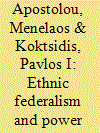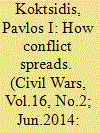| Srl | Item |
| 1 |
ID:
148651


|
|
|
|
|
| Summary/Abstract |
Negotiations for the settlement of the Cyprus question have resumed amid a pressing geopolitical and economic reality. Greek and Turkish Cypriots adopt distinct interpretations of the United Nations – designated recipe for a bicommunal and bizonal federation in Cyprus. In the relative absence of major normative preconditions for settlement, including a lack of common vision and mutual trust, the pillar notions of federalism and consociationalism have been adapted to serve each side’s vital security concerns and to increase each side’s leverage in a future federal arrangement in Cyprus. This study conducted an opinion poll of young, educated Greek Cypriots to identify the preferred type of constitutional settlement in the context of a number of perceived motives, constraints, and preconditions. The findings of this survey reveal substantial consensus on the acceptance of a bizonal, bicommunal solution. Yet acceptance of a federal solution is subject to certain prerequisites. The study reveals the varying influence of current economic concerns on a prospective solution.
|
|
|
|
|
|
|
|
|
|
|
|
|
|
|
|
| 2 |
ID:
133581


|
|
|
|
|
| Publication |
2014.
|
| Summary/Abstract |
This article examines the escalation of protest mobilization into armed conflict in the Republic of Macedonia (2001). The analysis argues that violence occurred because of a timely collusion between proximate causes and permissive conditions (causes). The state's inherent fragility and the perpetuation of unresolved grievances provided ground for the utilization of opportunity structures by dissident contestants. The study looks into the influence of spillover effects through the lens of contagion and diffusion effects including political radicalization, disputed borderlands refugee flows, and rebel capacity, and provides an assessment of the conditions shaping the decision of the Albanian rebels to use violence. Drawing from a series of elite interviews and documents, the article offers a critical insight into how ethno-regional interdependencies render a largely non-violent conflict susceptible to escalation. The study finds that contagion, disputed borderlands, and the availability of existing operational networks have played a crucial, if not decisive, role in the decision of politically active Albanians in the Republic of Macedonia to use violence.
|
|
|
|
|
|
|
|
|
|
|
|
|
|
|
|